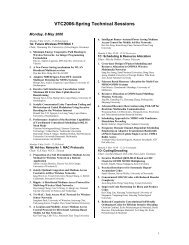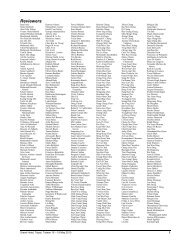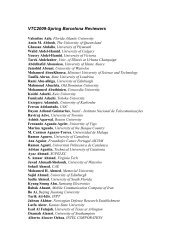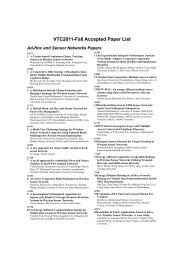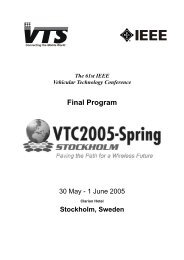Final Programme 2 â 5 June 2013 Dresden, Germany - ieeevtc.org
Final Programme 2 â 5 June 2013 Dresden, Germany - ieeevtc.org
Final Programme 2 â 5 June 2013 Dresden, Germany - ieeevtc.org
You also want an ePaper? Increase the reach of your titles
YUMPU automatically turns print PDFs into web optimized ePapers that Google loves.
Andreas Festag received a diploma degree (1996) and Ph.D.<br />
(2003) in Electrical Engineering from the Technical<br />
University Berlin. As researcher, he worked with the<br />
Telecommunication Networks Group (TKN) at Technical<br />
University Berlin, Heinrich-Hertz-Institute (HHI) in Berlin<br />
and NEC Laboratories in Heidelberg, where he lastly had the<br />
position of a Chief Researcher. Since <strong>2013</strong> he is research<br />
group leader at the Technical University <strong>Dresden</strong>, Vodafone<br />
chair Mobile Communication Systems. Andreas has worked<br />
on various research projects for wireless and mobile<br />
communication networks and published more than 50 papers<br />
in journals, conference proceedings and workshops. His<br />
research is concerned with architecture, design and<br />
performance evaluation of wireless and mobile<br />
communication systems and protocols, in the past years with<br />
a focus on vehicular communication and Intelligent<br />
Transportation Systems (ITS). He actively contributes to the<br />
CAR-2-CAR Communication Consortium and to ETSI<br />
Technical Committee ITS. He is senior member of IEEE.<br />
Oliver Klemp received his Dipl.-Ing. degree in 2002 and<br />
the Dr.-Ing. degree in 2007 (with distinction), both in<br />
Electrical Engineering from Leibniz University of Hannover.<br />
His principal research interests included antenna systems and<br />
electronics for MIMO wireless communications, signal<br />
processing in multiple antenna configurations and ultrawideband<br />
communications. Dr. Klemp joined Delphi Delco<br />
Electronics Europe GmbH in 2006 as a research engineer for<br />
antennas and receivers in the area of digital satellite radio<br />
systems. From 2007 through 2010 he worked as a product<br />
line architect and project manager in advanced engineering<br />
and series development with focus on antennas and<br />
transceivers for Vehicle-to-X communications and<br />
automotive infotainment systems. In 2010, Oliver Klemp<br />
joined BMW Group Research and Technology as a research<br />
specialist and project manager in the area of vehicle-centric<br />
communications with focus on Intelligent Transportation<br />
Systems (ITS).<br />
From 2007 through 2011 Dr. Klemp also held a position<br />
as an external lecturer for electromagnetic wave propagation<br />
and RF circuits and systems at the Institute of High<br />
Frequency Technology and Radio Systems at Leibniz<br />
University of Hannover.<br />
Dr. Klemp was awarded with a Gerotron Innovation<br />
Award in 2005 and is the recipient of the Scientific Award of<br />
the City of Hannover in 2008. He has authored or coauthored<br />
more than 50 papers in international journals and<br />
conferences and is co-author of the COST 2100 book<br />
“Pervasive Mobile and Ambient Wireless Communications”.<br />
Oliver Klemp is a member of the IEEE, the German<br />
Electrotechnical Association (VDE), COST IC 1004 and the<br />
Car-2-Car Communication Consortium.<br />
Christoph Mecklenbräuker was born in Darmstadt,<br />
<strong>Germany</strong>, in 1967. He received the Dipl-Ing. degree in<br />
Electrical Engineering from Vienna University of<br />
Technology in 1992 and the Dr.-Ing. degree from Ruhr-<br />
University of Bochum in 1998, respectively. His doctoral<br />
thesis was awarded with the Gert Massenberg Prize.<br />
From 1997-2000, he worked for the Mobile Networks<br />
Radio department of Siemens AG Austria where he<br />
participated in the European framework of ACTS 90<br />
FRAMES. He was a delegate to the Third Generation<br />
Partnership Project (3GPP) and engaged in the<br />
standardisation of the radio access network for UMTS.<br />
Since <strong>June</strong> 2000, he was a senior researcher at the<br />
Telecommunications Research Center Vienna (ftw.) in the<br />
field of mobile communications, key researcher since<br />
November 2002, and proxy since July 2003. Between 2006<br />
and 2009, he coordinated the Sixth Framework project<br />
“Multiple-Access Space-Time Coding Testbed” (MASCOT)<br />
on behalf of ftw. He leads the Special Interest Group on<br />
mobile-to-mobile communications within COST Action<br />
2100 Pervasive Mobile and Ambient Wireless<br />
Communications.<br />
In 2006, he joined the Institute of Communications and<br />
Radio Frequency Engineering at Vienna University of<br />
Technology as a full professor. Since July 2009, he leads the<br />
newly founded Christian Doppler Laboratory for Wireless<br />
Technologies for Sustainable Mobility. His current research<br />
interests include radio interfaces for future peer-to-peer<br />
networks (car-to-car communications, personal area<br />
networks, and wireless sensor networks), ultra-wideband<br />
radio (UWB) and MIMO-OFDM based transceivers (UMTS<br />
long term evolution, WiMax, and 4G).<br />
Christoph Mecklenbräuker is a member of the IEEE, the<br />
Antennas and Propagation Society, the Vehicular<br />
Technology society, the Signal Processing society, and<br />
EURASIP. He is the councilor of the IEEE Student Branch<br />
Wien. He is associate editor of the EURASIP Journal of<br />
Applied Signal Processing.<br />
Falko Dressler is a Full Professor for Computer Science<br />
and head of the Computer and Communication Systems<br />
Group at the Institute of Computer Science, University of<br />
Innsbruck. He is an Editor for journals such as Elsevier Ad<br />
Hoc Networks, ACM/Springer Wireless Networks<br />
(WINET), and Elsevier Nano Communication Networks. He<br />
was Guest Editor of special issues on self-<strong>org</strong>anization,<br />
autonomic networking, and bio-inspired communication for<br />
IEEE Journal on Selected Areas in Communications (JSAC),<br />
Elsevier Ad Hoc Networks, and others. Dr. Dressler is an<br />
IEEE Distinguished Lecturer in the fields of inter-vehicular<br />
communication, self-<strong>org</strong>anization, and bio-inspired and<br />
nano-networking. He is a Senior Member of the IEEE as<br />
well as a Senior Member of ACM. He is actively<br />
participating in the IETF standardization. His research<br />
activities are focused on adaptive wireless networking and<br />
self-<strong>org</strong>anization methods with applications in wireless ad<br />
hoc and sensor networks, inter-vehicular communication,<br />
bio-inspired and nano-networking, and network security.<br />
John Kenney is a Senior Research Manager at the Toyota<br />
InfoTechnology Center in Mountain View California, where<br />
he leads a vehicular networking research team. His research<br />
interests include wireless protocols at the MAC and Physical<br />
layers, congestion control, performance optimization and<br />
security. He represents Toyota in the CAMP VSC<br />
consortium and in international standards <strong>org</strong>anizations<br />
including IEEE, SAE, and ETSI. He holds a Bachelor’s<br />
degree and Ph.D. from Notre Dame and a Master’s from<br />
Stanford. Prior to his work for Toyota his research interests<br />
included high speed Internet switches, QoS, and adaptive<br />
systems.<br />
VTC Opening Plenary<br />
WiVeC attendees are invited to the VTC<strong>2013</strong>-Spring opening plenary on Monday, 3 <strong>June</strong>, from 8.00 – 10.00 in<br />
Saal 1-2. Full details can be found on Page 16.<br />
50 The 77th IEEE Vehicular Technology Conference VTC<strong>2013</strong>-Spring <strong>Dresden</strong> <strong>Programme</strong>



